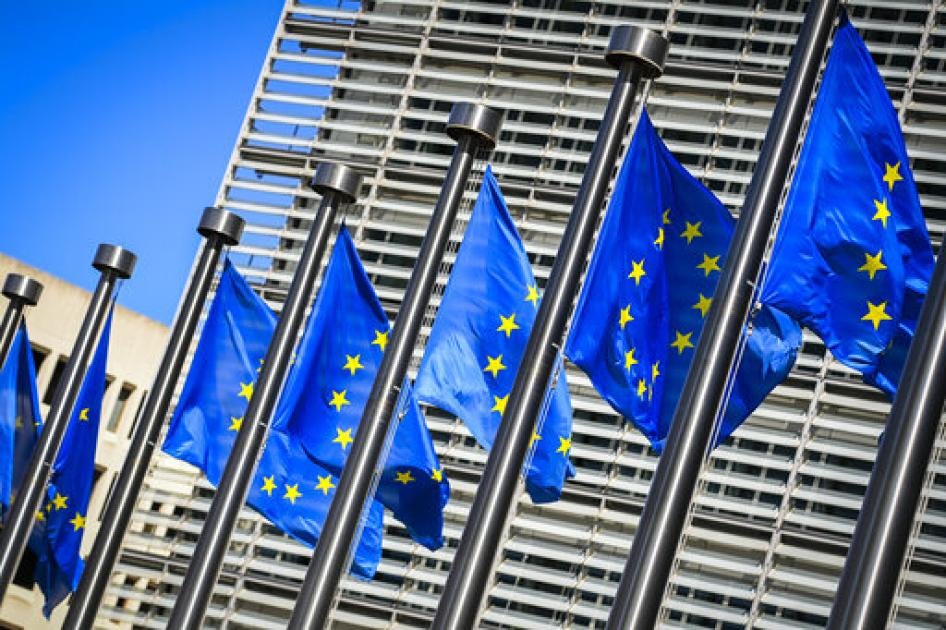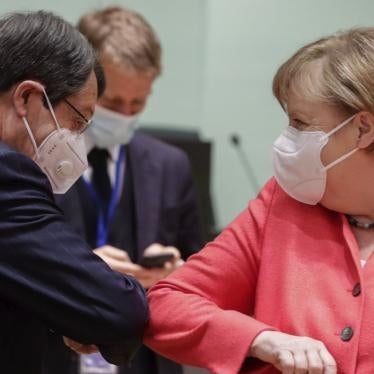On Monday, Germany’s European Union presidency delivered a disappointment.
The hope had been that, in announcing its version of a new mechanism to link some EU funding to respect for the rule of law, Berlin would help give the EU leverage to bring countries that have abandoned EU values back to democracy. Sadly, Germany’s watered-down text won’t do that.
First, Germany’s proposed mechanism provides for a voting system that makes it easier for too small a number of governments, most likely those that would run afoul of the mechanism, to block a Commission proposal to cut or suspend access to funds.
What’s more, the German text also offers the targeted state an opportunity to delay any decision by two months and force all EU heads of state to debate the proposed funding cut. Forcing EU member state leaders personally rather than their ambassadors in Brussels to take the time to discuss every proposal seems like an unnecessary impediment to action.
Second, the German text narrows the kinds of rule-of-law breaches that could justify cutting funds. Only rule-of-law problems that directly cause fraud or corruption would be sanctioned.
This seems oddly naïve.
Serious rule-of-law breaches can undermine democracy, lead to serious injustice, and impede the effective use of EU money without any link to fraud. A government might fire judges who uphold citizens’ rights that are threatened by the ruling party. A government might undermine media pluralism or the independence of civil society to silence watchdogs over their behavior and limit their accountability. A government might sidestep legal protections that protect minority groups or women from discrimination, impeding EU programs that struggle to protect them. Yet because these rule-of-law violations didn’t lead to fraud, none of them would yield consequences under Germany’s proposed mechanism. That is hardly a robust defense of the EU’s core democratic values or sound protection of its budget.
Most bizarrely, the German proposal omits any reference to the “rule of law” in its title. That omission might have been dismissed as a minor detail if the rest of the proposal had not been so watered down.
Despite this hollowed-out proposal, it is still not weak enough for the governments of Hungary and Poland. For weeks, Hungarian and Polish policymakers have been trying to blackmail the entire continent – by threatening to veto the EU budget – if any rule-of-law conditionality mechanism remains on the table. It was a predictable threat, as both governments face their peers’ scrutiny for their anti-democratic behavior under the Article 7 procedure. They are also, respectively, the largest per capita recipient of EU funding and the largest net recipient.
Viktor Orbán’s government in Hungary has undermined courts, curbed media freedom, hobbled civil society and put academic freedom in danger. In Mateusz Morawiecki’s Poland, the independence of courts has been so compromised that some EU states won’t extradite suspects there anymore. LGBT citizens of Poland now face harassment and even arrest on spurious charges.
Neither government is upholding the European values enshrined in EU treaties or the policies that European taxpayers agreed to pay for.
Meanwhile, the rule-of-law battle in Brussels continues. On Tuesday, Orbán called for European Commission Vice President Věra Jourová to resign over her criticism of Hungary’s record. One day later, the Commission’s first rule-of-law report painted a grim picture of the state of European democracies and how EU institutions so far have been given no leverage to reverse this backsliding.
Chancellor Merkel has made support for the rule of law a priority of her country’s six-month EU presidency. Tying access to EU funds to respect for the rule of law was and could still be a key way to implement her vision.
The Chancellor surely knows that bullies rarely change their behavior until others stand up to them – until there is a price to pay. She also surely knows that the only rule-of-law conditionality mechanism that Orbán would accept is one that doesn’t actually uphold and enforce Europe’s democratic values.
We should remember, however, that Orbán’s threat is largely a bluff. Only the EU multi-annual budget requires unanimity to get passed. The conditionality mechanism is a separate legal text whose adoption requires only a normal qualified majority. Hungary’s threat to veto the budget can be overcome with enough political will or by refusing to connect the two votes, as intended by the different voting procedures.
It’s time to stand up to Orbán and Morawiecki and secure a tool that can truly uphold the EU’s democratic values for years to come. There is still time during the German Presidency to say no to their blackmail.










